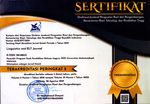Consonant Confusion: Pronunciation Challenges among English Club Members
Abstract
This study examines pronunciation errors among university students learning English as a second language, focusing on members of the English Club, primarily Balinese learners. Despite English being a global language and widely learned as a second language, pronunciation remains a significant challenge, often influenced by the learners' native language. This research employs a qualitative approach with purposive sampling to select a sample of 11 participants who are not majoring in English. These participants were chosen through observation and a questionnaire. Data are collected by having the participants read a story, "Pan Balang Tamak," to identify specific pronunciation errors and understand how their native language affects their English pronunciation. This research finds that the most type of error is misformation in some sounds such as /θ/, /ð/, /ʃ/, /tʃ/, /dʒ/, /ʒ/. This type of error occurs due to the dissimilarity of certain sounds between English and the native language. Additionally, pronunciation skills among English Club members must be improved to reduce recurring errors
Keywords
Full Text:
PDFReferences
B. Hayes, Introductory phonology. Oxford: Wiley-Blackwell, 2009.
F. H. International, N. Mack, C. Woodsong, and U. States, Qualitative research methods: a data collector’s field guide. North Carolina: FLI USAID, 2005.
Faradila Mesfer, Muhammad Yahrif, and Suharti Siradjuddin, “An Error Analysis Of Undergraduate Students’ English Pronunciation,” EDULEC Educ. Lang. Cult. J., vol. 4, no. 1, pp. 79–93, Apr. 2024, doi: 10.56314/edulec.v4i1.220.
H. C. Dulay, M. K. Burt, and S. D. Krashen, Language two. New York: Oxford University Press, 1982.
J. C. RICHARDS, “A Non-Contrastive Approach to Error Analysis1,” ELT J., vol. 19, no. 3, pp. 204–219, Jun. 1971, doi: 10.1093/elt/XXV.3.204.
K. A. King, “Research methods in language and education,” New York : Springer Berlin Heidelberg, 2017.
L. Yates, B. Zielinski, and Adult Migrant English Program, Give it a go: teaching pronunciation to adults. North Ryde : Adult Migrant English Program (AMEP) Research Centre, 2009.
Manurung, L. Wahyuni, C. N. Saragi, and A. S. Sitinjak, “Diagnosing The English Department Students’ English Vowel And Consonant Pronunciation Errors By Using Elsa Speak Application,” Innov. J. Soc. Sci. Res., vol. 4, no. 1, pp. 3673–3686, 2024.
M. Marlina, “Identifikasi Kesulitan Pelafalan Kosakata pada Pembelajaran Bahasa Inggris Siswa Sekolah Dasar,” Karimah Tauhid, vol. 2, no. 1, pp. 313–318, 2023.
M. N. Annisa, D. R. Puspita, and I. Magdalena, “Analisis Kesalahan Pelafalan Bahasa Inggris Siswa Sekolah Dasar,” J. Educ. Rev. Res., vol. 5, no. 1, pp. 38–46, Jul. 2022, doi: 10.26737/jerr.v5i1.3300.
M. O. Onwochei and A. Bako, “Influence of Mother Tongue on English Pronunciation: A Contrastive Analysis of Bogghom and English Phonemes,” Int. J. Arts Humanit., vol. 2, no. 1, pp. 72–88, Aug. 2024, doi: 10.61424/ijah.v2i1.98.
P. Rogerson-Revell, English phonology and pronunciation teaching. New York: Continuum, 2011.
P. S. Rao, “The role of English as a global language,” Res. J. English, vol. 4, no. 1, pp. 65–79, 2019.
S. Nur’Aini, “Analysing the acoustic evidence of consonant productions among students at the university level,” LITERA, vol. 23, no. 1, pp. 76–90, Mar. 2024, doi: 10.21831/ltr.v23i1.67775.
Visitbali, “Pan Balang Tamak, The Folk Story Of A Clever And Smart Man,” visitbali.id, 2024. https://visitbali.id/property/pan-balang-tamak-the-folk-story-of-a-clever-and-smart-man
Wisudayanti, K. H. Oktarina, and P. D. A. Hikmaharyanti, “Students’ Pronunciation Improvement by Computer Assisted Pronunciation Teaching (CAPT),” in Proceedings: Linguistics, Literature, Culture and Arts International Seminar (LITERATES), 224-229, 2022.
DOI: https://doi.org/10.31764/leltj.v13i1.29669
Refbacks
- There are currently no refbacks.
Copyright (c) 2025 Putu Desi Anggerina Hikmaharyanti, Ni Komang Nira Desi Anggerina Dewi

This work is licensed under a Creative Commons Attribution-ShareAlike 4.0 International License.
_____________________________________________________
Linguistics and ELT Journal
p-ISSN 2339-2940 | e-ISSN 2614-8633

LELTJ is licensed under a Creative Commons Attribution-ShareAlike 4.0 International License.
_____________________________________________________
LELTJ is abstracting & indexing in the following databases:
_____________________________________________________
LELTJ Editorial Office:













